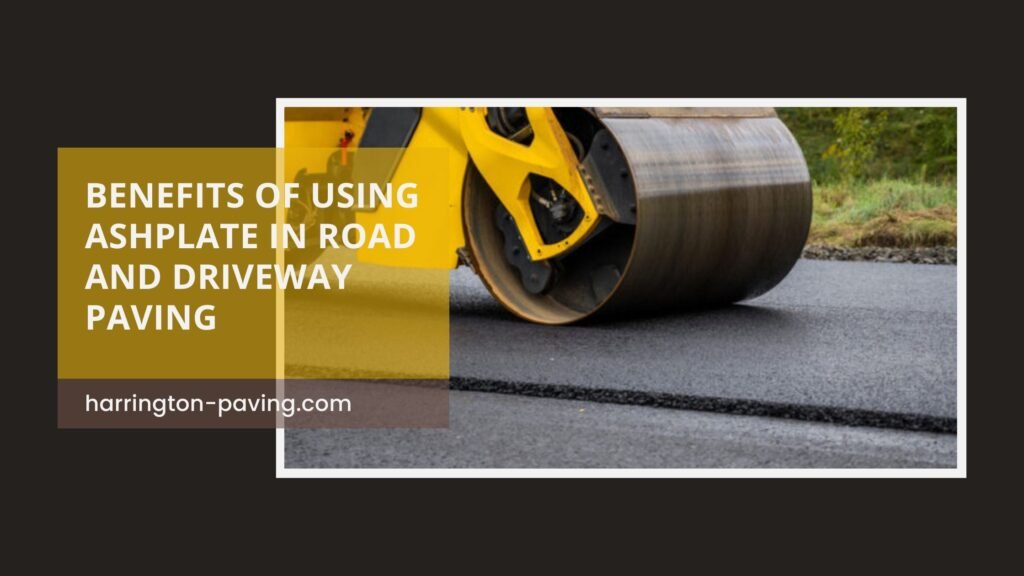Picking the right base layer makes or breaks the driveway paving job. Use the wrong one, and your surface won’t last. Use the right one, and you get years of solid performance.
Most jobs use gravel, asphalt, or crushed stone. They work. But they come at a cost. You get to face high material prices, more hauling, and sometimes poor drainage. Comparatively, Ashplate is tough, cheaper to source, and puts waste material to good use.
More contractors are now switching to ashplate. And contractors at Harrington Paving lead the way forward.
This guide breaks down what ashplate is, how it performs on real jobs, and how it compares to traditional base materials. No complexities, just facts that help you build better.

Did You Know?
Most driveway and road failures start below the surface — with a weak base, not the top layer.
That’s why more contractors are switching to Ashplate — a compacted, recycled material that’s stronger, more affordable, and eco-friendly.
What Is Ashplate?
Ashplate is made by compacting leftover ash and industrial waste into a solid base layer. It is dense, stable, and built to handle heavy loads.
It usually comes from places like coal plants and recycling centers. Instead of dumping that material in landfills, it’s cleaned up and put to work.
Used correctly, an ashplate for roads offers strength and longevity without breaking the bank. It’s gaining traction in green construction because of its low carbon footprint and smart reuse of waste materials.
Need a Stronger, Smarter Base for Your Next Paving Job?
Get a Free Ashplate Estimate5 Key Benefits of Ashplate Paving
1. Low Cost, High Value
Materials and transport eat up budgets. Ashplate driveway material is cheaper than standard gravel or asphalt base. It’s usually sourced locally, which slashes trucking costs.
Bottom line is, ashplate brings real savings without cutting corners on quality.
2. Sustainable and Eco-Conscious
When you choose ashplate paving, you keep tons of waste out of landfills. In short, it’s recycling done right.
Perfect for contractors aiming to meet green building standards and property owners who care about impact. Less waste, less guilt, more value.
3. Strong and Reliable
Ashplate is not a soft filler. When compacted, it becomes a tight, stable surface that holds heavy loads.
Contractors use it for:
- Residential driveway paving
- Parking lot asphalt paving base
- Farm or private access roads
- Utility paths
It holds its ground. No cracks, no dips, and nothing to worry about down the line.
4. Handles Water Like a Pro
Water can wreck a poorly prepped base. But ashplate helps manage drainage. It causes no puddles, no erosion, and no weak spots.
And the water damage is comparatively Less, which means fewer repairs and more years out of your pavement.
5. Locally Sourced and Easy to Find
Most contractors can obtain ashplates from nearby plants or recycling centers. It’s available but might be tough to find. However, that saves fuel, time, and headaches. If your job site is on a timeline, Ashplate delivers.
Tired of Cracks, Dips, and Drainage Issues?
Talk to a Paving Pro TodayWhere Is Ashplate Used in Road and Driveway Paving?
You might see ashplate used in all kinds of places:
- Ashplate for roads in rural and semi-urban builds
- Sub-base for asphalt paving projects
- Under concrete slabs and driveway paving
- Trail paths and utility roads in parks or farmland
- Heavy-use areas like parking lots or industrial zones
Using an ashplate saves money and gives you a base that stays strong for the long haul.
Ashplate vs Asphalt? No More Confusion…
People often confuse ashplate with asphalt because the names sound alike. Let’s set it straight.
- Ashplate is the base layer. It is pure compacted ash or recycled mix.
- Asphalt is the top surface. It is a mix of bitumen and gravel, black and sticky when hot.
Ashplate vs Asphalt and Gravel: Which Base Material Is Best for Roads and Driveways?
| Material | Cost | Eco-Friendliness | Strength Under Load | Drainage |
|---|---|---|---|---|
| Ashplate | Budget-friendly | Very high (recycled) | Solid when compacted | Handles water well |
| Gravel | Mid-range | Moderate | Strong and reliable | Good flow |
| Asphalt Base | Most expensive | Low (non-recycled) | Extremely strong | Average at best |
If you want something cost-effective, sustainable, and tough enough to last, Ashplate checks every box.
Why Contractors Prefer Ashplate for Driveway and Road Paving
As someone who’s been in the paving game for years, I’ve used every base out there. Ashplate? It holds its own.
I recommend it when the job calls for:
- Budget control
- Strong support
- Eco-conscious builds
- Fast access to material
When we prep a site for asphalt paving, ashplate makes the perfect base. You get the same stability at a lower cost, and your pavement lasts.
Ready to Build a Driveway That Lasts?
Book Your Ashplate ConsultationIs Ashplate the Right Base Material for Your Driveway or Road Project?
If you’re building a new road, driveway, or parking lot. It is suggested to look at the base first.
Ashplate gives you:
- Long-term durability
- Smart savings
- A greener job site
Want a solid surface that holds up? Start with ashplate paving.
Ready to Build?
We supply and install ashplate across residential and commercial projects. Contact us at harrington-paving.com for a free estimate on ashplate paving, asphalt driveways, or full paving process services.
FAQs
Is ashplate strong enough for a driveway or road?
How is ashplate different from asphalt?
Is ashplate a good option if I’m on a budget?
Does ashplate help with drainage?
Author

